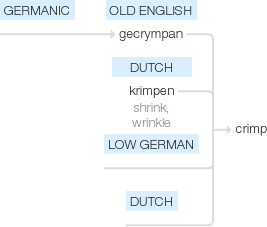Crimp
Old English gecrympan, of Germanic origin; related to Dutch krimpen ‘shrink, wrinkle’. Of rare occurrence before the 18th century, the word was perhaps reintroduced from Low German or Dutch.
wiktionary
From Middle English crimpen(“to be contracted, be drawn together”), from Middle Dutch crimpen, crempen(“to crimp”), from Proto-Germanic *krimpaną(“to shrink, draw back”) (compare related Old English ġecrympan(“to curl”)). [1] Cognate with Dutch krimpen, German Low German krimpen [2], Faroese kreppa(“crisis”), and Icelandic kreppa(“to bend tightly, clench”). Compare also derivative Middle English crymplen(“to wrinkle”) and causative crempen(“to turn something back, restrain”, literally “to cause to shrink or draw back”), both ultimately derived from the same root. See also cramp.
Uncertain. Likely from etymology 1, above, but the historical development is not clear. Attested since the seventeenth century. [3]
etymonline
crimp (v.)
late 14c., "cause to contract or be wrinkled or wavy." Old English had gecrympan "to crimp, curl," but the modern word probably is from Middle Dutch or Low German crimpen/krimpen "to shrink, crimp." Sense of "bend back or inward, draw together" is from 1712. Related: Crimped; crimping.
crimp (n.)
"that which has been crimped or curled," 1863, "natural curl in wool fiber," from crimp (v.). In reference to crimped hair by 1867. To put a crimp in or on (something) is by 1896, U.S. slang.
